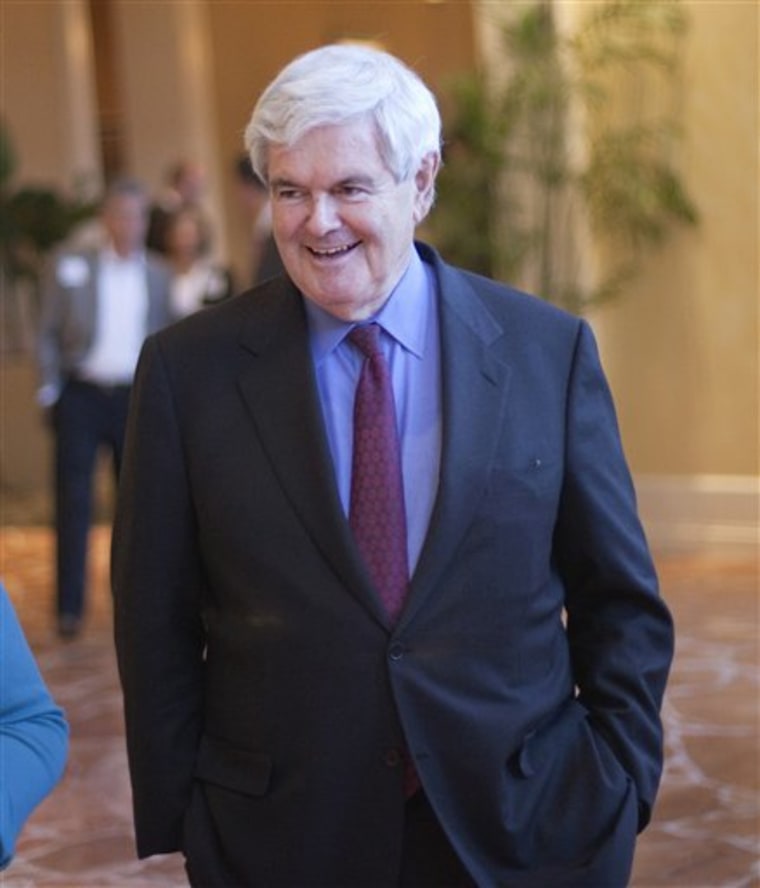At fundraising dinner after dinner, state Republican Party Chairman Jack Kimball earns loud applause when he declares that New Hampshire will send forward "a good strong conservative nominee for the presidency of the United States."
But it won't be just Republicans who pick a winner in the first-in-the-nation presidential primary next year.
Independent voters, who make up nearly 42 percent of registered voters in the state, can participate in either party's primary. And, given that President Barack Obama has no serious Democratic challenger, most independents are expected to cast ballots in the GOP race next February, unlike in the last presidential campaign.
That means Republican White House hopefuls who have been courting Republicans at party fundraising dinners and holding private meetings with Tea Party activists will have to branch out: beyond talking about things like the Declaration of Independence and conservative Republican talking points. They'll also have to talk to New Hampshire independents.
"The discourse so far here in New Hampshire really mirrors the very conservative discourse we're hearing with the Tea Party and among conservative elites around the country," said political analyst Dean Spiliotes. "The question is, how much of that is going to appeal to independents?"
Independent voters in the "Live Free or Die" state are notorious for, well, being independent. And sometimes so much so that they've helped upend presidential primary contests.
In 2008, more chose to vote in the Democratic primary between Barack Obama and Hillary Rodham Clinton than in the sleepier GOP contest between a slew of Republican contenders. Exit polls showed that six in 10 independents voted in the Democratic contest. Although Obama won more independent votes, they contributed to the coalition Clinton stitched together to stage a comeback victory after a disastrous Iowa defeat. Independents also were critical to Republican John McCain's victory here, which set him on the path to winning the GOP nomination.
Four years earlier, the Democratic primary took center stage because President George W. Bush faced only token opposition on the Republican ballot. More than 75 percent of the ballots cast in the New Hampshire primary that year were on the Democratic side, and according to exit polls, nearly half of those voting in the Democratic primary were registered as independents.
Heavy independent participation
That suggests potentially heavy independent participation in next year's Republican primary, which is tentatively set for Feb. 14, 2012.
Also, a University of New Hampshire Survey Center poll in February found about 40 percent of independents — or "undeclared" as they're called here — said they plan to vote in the Republican primary, about 30 percent said they plan to vote in the Democratic primary, even though it's not expected to be contested, and 30 percent weren't sure.
Former Massachusetts Gov. Mitt Romney led the field in that poll. But it means little; nearly 80 percent of likely GOP primary voters said they were still making up their minds. And independents tend to wait longer than others to pick a candidate, sometimes as late as Election Day.
Many Republican hopefuls, including former Pennsylvania Sen. Rick Santorum, dismiss questions about whether they're focusing too much on GOP voters in the state, saying their messages will resonate because independents appreciate fiscal conservatism as much as Republicans.
In a visit to the state last week, former House Speaker Newt Gingrich ticked off the high costs of gasoline and heating oil, joblessness and budget-busting spending and said: "I think there are a lot of independent voters who have an interest in those kinds of real, substantive issues, and I would try to appeal to them" with suggested solutions.
Like Gingrich, former Minnesota Gov. Tim Pawlenty argues that his record on taxes and spending will appeal to independents as well as Republicans. But he says that as a former governor of a Democratic-leaning state, he has an edge over other candidates because he has proven he can reach beyond his party to win.
"I have not just the rhetoric of saying I can or will do this, but I've actually done it," Pawlenty said in a phone interview, adding that he's mindful that the New Hampshire primary will include independents. "I welcome that."
'I switch when it feels right'
Still, the challenges for the Republican candidates are great because independent voters by nature are a fickle bunch.
Just ask Ron Morse, an independent from the town of Weare.
He voted for Clinton in the 2008 primary and Obama in the general election but isn't hot on anyone this time and doesn't know what he will do come 2012.
"I switch when it feels right. Right now, I don't feel the president's doing a good job," said Morse, 60, as he had breakfast at a Manchester diner recently when Mississippi Gov. Haley Barbour stopped by. "There's nobody so far that I want to vote for." He said he "definitely" wouldn't back Romney. "And definitely not that Alaskan chick," he said, referring to former Alaskan Gov. Sarah Palin.
It turns out that Barbour doesn't sit well with him either; Morse said he was annoyed that Barbour brushed off his concerns about potential cuts to Medicare and Social Security.
Wayne Gagne, a co-chairman of the "New Hampshire Independents for McCain Coalition," in 2008, said last week he doesn't know which primary he'll vote in next year, though he, too, has ruled out Romney and Palin, and Gingrich, too. He thinks Obama is on the right track on health care, but he has friends who think highly of Pawlenty, and he likes the way Donald Trump thinks.
"Sometimes he thinks like me: just get it done. He's right to the point, and I like that feature in anybody, frankly," said Gagne, 60, a retired locomotive engineer from Nashua, said of Trump. "But how will he do politically in the world's problems? I don't know. Nothing impresses me yet."
